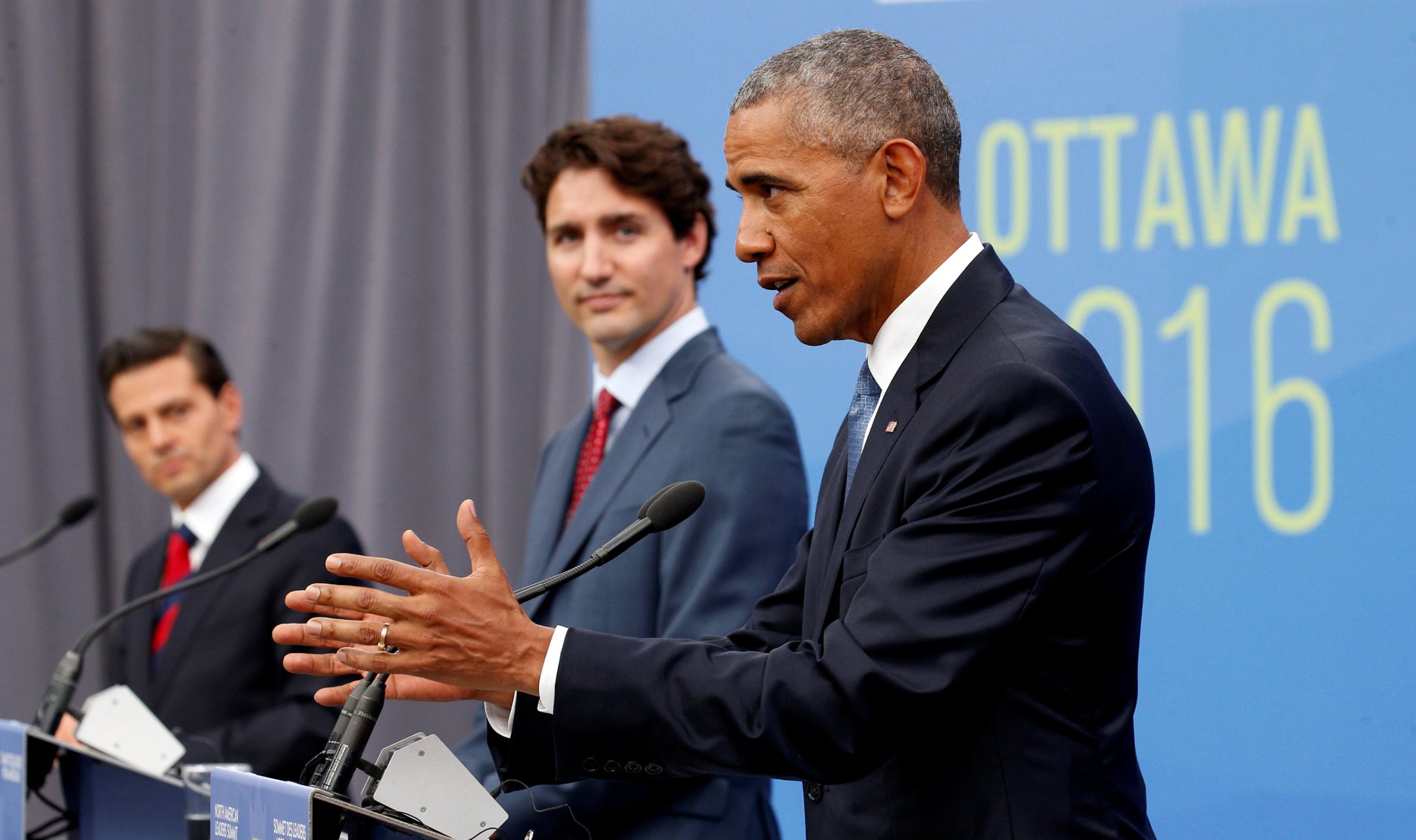
At a press conference in Canada on Wednesday, President Obama indulged himself in what he referred to as “a rant” about the meaning of the word “populist.” Like most rants, it was more spirited than factual—and it revealed an interesting blind spot in the way American liberals construe U.S. history.
Obama’s trigger was the use of the word “populism” to describe the divisive and conspiratorial politics of Donald Trump. “I’m not prepared to concede the notion that some of the rhetoric that’s been popping up is populist,” the president declared during a joint appearance with the leaders of Canada and Mexico.
Populism, he insisted, has to do with protecting the little guy against powerful corporate interests, guaranteeing educational opportunity regardless of wealth, and insuring a fair shake for workers. “I suppose that makes me a populist,” Obama said.
“They don’t suddenly become a populist because they say something controversial in order to win votes,” he said. “That’s not the measure of populism; that’s nativism or xenophobia … or it’s just cynicism,” he continued. “Somebody who labels us versus them, or engages in rhetoric about how we’re going to look after ourselves and take it to the other guy, that’s not the definition of populism.”
In fact, the history of American populism is full of nativism and xenophobia, not to mention racism and religious bigotry. This used to be widely understood.
Populism, American-style, has its roots in the economic upheaval of the early industrial age, when subsistence farming gave way to modern trade-based society. In the late 19th century, farmers found themselves increasingly dependent on railroads to take their crops to distant markets. Controlled by trans-Atlantic financiers and their hand-picked elected officials, the railroads were exactly the sort of powerful corporate interest that Obama had in mind.
The Farmers Alliance movement of the 1870s and 1880s—with support from some labor organizations—evolved into a Populist party that surged to national prominence in the 1896 presidential election. Stoked by resentment over the crushing recession of 1893, the Populists helped to lift William Jennings Bryan to the Democratic nomination at a convention where Bryan denounced international financiers in his famous “Cross of Gold” speech.
“The man who is employed for wages is as much a business man as his employer,” declared Bryan, in the egalitarian tones that earned him the nickname, “the Great Commoner.” “The merchant at the cross-roads store is as much a business man as the merchant of New York; the farmer who goes forth in the morning and toils all day … is as much a business man as the man who goes upon the Board of Trade and bets upon the price of grain; the miners who go down a thousand feet into the earth … are as much business men as the few financial magnates who, in a back room, corner the money of the world.”
On this note, modern liberals like Obama bring their account of Populism to a ringing end. In this, they’ve followed the lead of author Thomas Frank, whose 2004 bestseller “What’s the Matter With Kansas?” spun a theory of modern politics from a potted history of Midwestern populism. The trouble is, Populism did not end with the 1896 campaign.
By marrying into the Democratic Party, which was dominated by the Jim Crow South, the Populists hitched their wagon to the politics of racism, nativism, and xenophobia. Their conspiratorial view of economics originally led them to reach out to downtrodden African-Americans and oppressed immigrants as fellow soldiers in the battle between us-and-them. But in the first two decades of the 20th century, those same attitudes became entangled with notions of nefarious Yankees, Jewish manipulators, and wage-draining immigrants.
This was the zenith of the Ku Klux Klan, which rose in the years after World War I to political influence from California to Indiana, Oregon to Colorado. “The Klan of the twenties might be best understood as a populist organization,” writes Shawn Lay, editor of “The Invisible Empire in the West.”
Thomas Watson of Georgia epitomized the rancid turn. Starting out as a friend of the little guy, the Populist firebrand morphed into a hateful, xenophobic, and deeply divisive figure. Bryan, too, experienced this ugly evolution. A generation after his 1896 triumph, Bryan climbed the stage at the 1924 Democratic Convention to deliver a speech against a platform plank that would have repudiated the Klan. In helping to defeat the progressive measure, Bryan spoke “with his old-time fire and enthusiasm,” eyewitness Elmer Davis reported in the New York Times.
Populism is not an agenda; it is a way of viewing the world. It can come from the left or the right. It can be progressive or reactionary—or both, in an incoherent mix. It is simply the political expression of the free-floating sense that power corrupts, that those who have power conspire to keep it at the expense of humane and patriotic values. There is a streak of populism is virtually every American—it’s no accident that the opening words of the Constitution are “We the people.” But as long as people are capable of hatreds, resentments, and small-mindedness, populism will never be as simple as Barack Obama would like it to be.
And that, alas, will be a long, long time.
More Must-Reads from TIME
- Donald Trump Is TIME's 2024 Person of the Year
- Why We Chose Trump as Person of the Year
- Is Intermittent Fasting Good or Bad for You?
- The 100 Must-Read Books of 2024
- The 20 Best Christmas TV Episodes
- Column: If Optimism Feels Ridiculous Now, Try Hope
- The Future of Climate Action Is Trade Policy
- Merle Bombardieri Is Helping People Make the Baby Decision
Contact us at letters@time.com